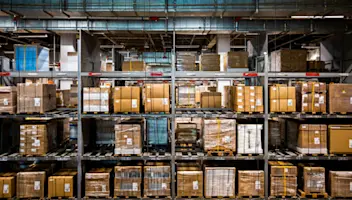Distribution ERP Solutions: 10 Vital Questions to Ask Your ERP Vendor
Distribution ERP Solutions: 10 Vital Questions to Ask Your ERP Vendor
Distribution ERP Solutions: 10 Vital Questions to Ask Your ERP Vendor
Nov 1, 2021
Aptean Staff Writer
Your distribution business has gotten to a critical point. Your current systems and processes aren’t meeting your needs, and you cannot grow. What can you do?
To thrive in this connected, customer-centric industry, you need technology that will keep you competitive—in short, you need a distribution ERP system.
An ERP will help you grow your business by automating end-to-end business processes. This increases productivity in every department and gives everyone access to fundamental business metrics. You’ll have instant access to important KPIs, which allows you to make better business decisions.
There are hundreds of ERP vendors out there, so how do you choose the right one for you? As you evaluate vendors and their systems—determining the must-have features—you need to ask the right questions. The guide below gives you the definitive questions—and best-practice answers—to help you find the distribution ERP solution that works best for your company.
Question 1: Does Your Solution Have EDI?
It absolutely needs to. Most retail customers require EDI before they will do business with you. You need to exchange documents quickly and accurately and adapt to changing retailer requirements. Preferably, the EDI solution should be built into the distribution ERP, not as an add-on. That way, it is an integrated and managed service. Having an EDI with managed services means that you can concentrate on growing your business, not on constantly changing retailer requirements.
Question 2: Does My Team Get Access to Centralized Order and Customer Information, And Is It Accessible from Mobile Devices?
As a consumer goods distributor, you know the level of customer service that your team must provide is higher than ever. Your customers expect personalized service, and don’t want to be put on hold while your sales or service team looks through their file to track their order. Your ERP needs to be accessible to everyone in the office, as well as to team members that work remotely. With the right distribution ERP, your entire enterprise will have instant access to all client information.
This includes current customer history, including notes and discounts; inventory availability; shipping delays and exceptions; tracking; and even variable discounts. The system should offer customizable screens for different users. For instance, the sales team will need different information than your service team and the warehouse team will need another set of data. Customizable screens solve this user dilemma. For example, your service team can see where an order is at a moment’s notice when a customer calls in. In addition, your sales team can also access the system from anywhere, so that they can easily communicate with customers while on the road.
Question 3: Will I Know Inventory Status All the Time, and in Real Time?
You should. For your industry, having built-in warehouse management and import management tools will give you complete visibility along every step of the order processing and fulfillment. With these tools, once your sales team inputs an order, the system processes it automatically. Shipment, container, and other import management tools give you a 360-degree view of incoming inventory and instantly calculates landed costs. This ensures that you’ll have accurate profit margins on every product.
Once the shipment arrives, integrated warehouse management tools administer the inventory, including receiving, picking and putaway of goods. It’s also a good idea to ask if the vendor offers direct-to-consumer shipping tools which integrate with all the major carriers.
Question 4: Does Your Solution Have an Ecommerce Platform?
You know that to grow your business, you need to get your products in front of customers and give them an online portal to input orders. In the past, distributors connected their full product catalog with an ecommerce platform that was disconnected from their ERP, which left the entire process open for errors. It’s recommended to have the ecommerce solution built into the ERP, rather than depending on a third-party provider, because integration might be problematic otherwise. You want an integrated ecommerce online storefront that gives your customers a user-friendly shopping experience and gives you the integrated B2C storefront you need.
Question 5: Can the Purchase Order Process Automate Sales Order Fulfillment?
Previously, consumer goods distributors had to accumulate back orders and then place a large master order. Then you had to match up the master order as stock came in and orders sat at the dock while everyone waited for the last pieces to arrive. Ten years ago, that system was the norm, and it might have worked then—but not now. Your customers expect immediate answers. A fully integrated distribution ERP system synchronizes ordering and purchasing processes automatically to optimize inventory management and order fulfillment.
Question 6: Do You Have On-Premise or Cloud Solutions, or Both?
Before purchasing any ERP system, this is a decision your implementation team will need to make. Both types of deployment have pros and cons. Ultimately, it comes down to whether you have a good in-house IT and internet security team. If you do, on-premise solutions will work well for you but be aware that these solutions are not as scalable. True cloud-based systems are the best option for most growing distribution companies. Cloud-based distribution ERP solutions are accessible from anywhere and if something goes wrong, it is your vendor’s responsibility to fix the issue.
Question 7: Does the System Support Scalability, and Is It Flexible?
In a perfect world, your ERP solution should be scalable. You want a system that will grow with you. You want your vendor to provide protected data backups, so that you don’t have to worry about equipment and maintenance. You want to achieve real-time visibility and control over your distribution business operations system-wide. You should ensure your system provides integrated financial planning, forecasting, and industry-specific capabilities, which will deliver the actionable data and flexibility needed to maximize efficiency and react swiftly to customer demands.
Question 8: What Features Do I Need?
There is no simple, “one-size-fits-all” answer to this question. But when talking with potential vendors you need to think about whether the features they offer are “have to have” requirements, or “nice to have” options. Spend some time drawing up a requirements specification. With an industry-specific ERP, the vendor has thought about what requirements distributors like you have asked for and has created an ERP that is tailored to fit your needs.
Long-term use is vital when thinking about features because you will need to be able to sell across multiple channels. You know better than anyone what features you need, so it’s up to the vendor to tailor the solution to your specific business, not the other way around. Your vendor should have expert knowledge of your industry sector, so that they can easily address any gaps in functionality and have prebuilt applications to address those issues.
Question 9: How Involved Will You Be in the Implementation Process, and Do You Offer Ongoing Training?
Your vendor should be with you every step of the way, from the initial consultation to the final test—and beyond. If they just sell you the software and move on, it’s a big red flag. Your vendor’s team should consult with you at the outset and offer demos so you can assess whether their solution will meet your needs. Your distribution ERP solution partner should analyze your current business practices, and then make recommendations for best practices that you could implement.
During implementation, the vendor’s team of experts need to work together with your project team to ensure that the process goes correctly, verify data accuracy, and do comprehensive tests of the system before deployment. They should offer training before, during and after go-live. After that, they should work with you for the life of the product to provide ongoing consultation and training. If you require custom enhancements, they need to provide those, too.
Question 10: Why Should We Pick You?
It may be a cliché, but every business is different. There is no magic formula to choose the best ERP to meet your needs; but when you are searching for an ERP solution, be sure to work with a provider that knows the consumer goods importing and distribution industry. Someone who knows about managing ERP implementations in your sector will not only increase your chances at a successful implementation, but it will also mitigate risk.
Every vendor will be eager to show you all the fun bells and whistles that their product has, but if it’s a generic ERP solution, many of those nifty-sounding tools will be useless to you. Instead, look for vendors that have a team of experts that know your industry inside and out, and can talk with you honestly about what tools your business will actually use.
Getting the best ROI out of your distribution ERP means constantly assessing the way the solution works for your organization. Aptean has the distribution industry specialists your company needs to help you now—and in the future. We’ve worked with hundreds of companies like yours to help them implement ERP solutions that work perfectly for the consumer goods distribution vertical. We’ll be your partner, not just a vendor.
Ready to learn more about how an industry-specific distribution ERP can help your business expand? Talk to one of our distribution industry experts today.
Related Articles


¿Todo listo para transformar tu negocio?
Tenemos las soluciones ERP especializadas que necesitas para superar los desafíos de tu sector.






